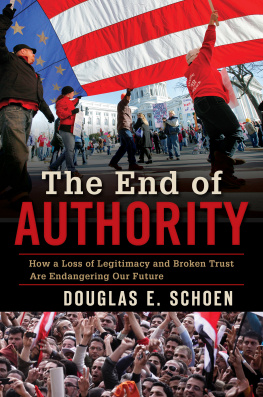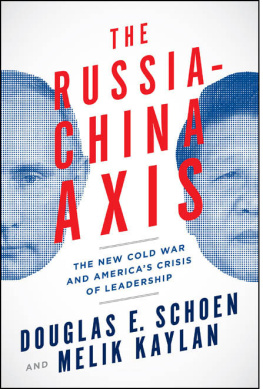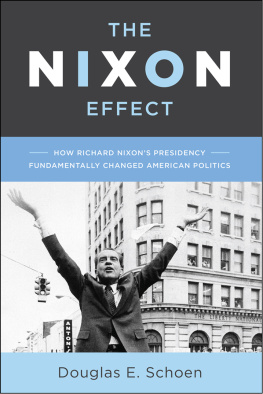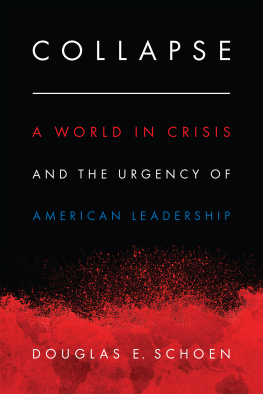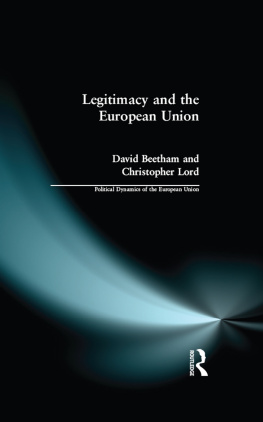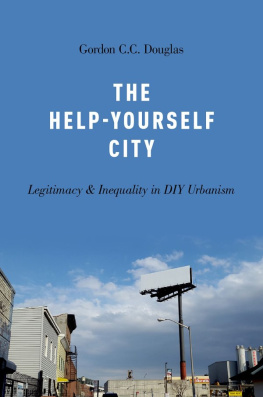Douglas E. Schoen - The End of Authority: How a Loss of Legitimacy and Broken Trust Are Endangering Our Future
Here you can read online Douglas E. Schoen - The End of Authority: How a Loss of Legitimacy and Broken Trust Are Endangering Our Future full text of the book (entire story) in english for free. Download pdf and epub, get meaning, cover and reviews about this ebook. year: 2013, publisher: Rowman & Littlefield Publishers, genre: Science / Politics. Description of the work, (preface) as well as reviews are available. Best literature library LitArk.com created for fans of good reading and offers a wide selection of genres:
Romance novel
Science fiction
Adventure
Detective
Science
History
Home and family
Prose
Art
Politics
Computer
Non-fiction
Religion
Business
Children
Humor
Choose a favorite category and find really read worthwhile books. Enjoy immersion in the world of imagination, feel the emotions of the characters or learn something new for yourself, make an fascinating discovery.
- Book:The End of Authority: How a Loss of Legitimacy and Broken Trust Are Endangering Our Future
- Author:
- Publisher:Rowman & Littlefield Publishers
- Genre:
- Year:2013
- Rating:5 / 5
- Favourites:Add to favourites
- Your mark:
- 100
- 1
- 2
- 3
- 4
- 5
The End of Authority: How a Loss of Legitimacy and Broken Trust Are Endangering Our Future: summary, description and annotation
We offer to read an annotation, description, summary or preface (depends on what the author of the book "The End of Authority: How a Loss of Legitimacy and Broken Trust Are Endangering Our Future" wrote himself). If you haven't found the necessary information about the book — write in the comments, we will try to find it.
The End of Authority: How a Loss of Legitimacy and Broken Trust Are Endangering Our Future — read online for free the complete book (whole text) full work
Below is the text of the book, divided by pages. System saving the place of the last page read, allows you to conveniently read the book "The End of Authority: How a Loss of Legitimacy and Broken Trust Are Endangering Our Future" online for free, without having to search again every time where you left off. Put a bookmark, and you can go to the page where you finished reading at any time.
Font size:
Interval:
Bookmark:
The End of Authority
The End of Authority
How a Loss of Legitimacy and Broken Trust Are Endangering Our Future
Douglas E. Schoen
ROWMAN & LITTLEFIELD
Lanham Boulder New York Toronto Plymouth, UK
Published by Rowman & Littlefield
4501 Forbes Boulevard, Suite 200, Lanham, Maryland 20706
www.rowman.com
10 Thornbury Road, Plymouth PL6 7PP, United Kingdom
Distributed by National Book Network
Copyright 2013 by Douglas E. Schoen
All rights reserved. No part of this book may be reproduced in any form or by any electronic or mechanical means, including information storage and retrieval systems, without written permission from the publisher, except by a reviewer who may quote passages in a review.
British Library Cataloguing in Publication Information Available
Library of Congress Cataloging-in-Publication Data
Schoen, Douglas E., 1953
The end of authority : how a loss of legitimacy and broken trust are endangering our future / Douglas E. Schoen.
pages cm
Includes index.
ISBN 978-1-4422-2031-7 (cloth : alk. paper) ISBN 978-1-4422-2032-4 (electronic)
1. Legitimacy of governments. 2. Government, Resistance to. 3. Power (Social sciences) 4. State, The. 5. Income distributionPolitical aspects. 6. Political corruption. I. Title.
JC497.S36 2013
320.01'1dc23
2013024949
 TM The paper used in this publication meets the minimum requirements of American National Standard for Information Sciences Permanence of Paper for Printed Library Materials, ANSI/NISO Z39.48-1992.
TM The paper used in this publication meets the minimum requirements of American National Standard for Information Sciences Permanence of Paper for Printed Library Materials, ANSI/NISO Z39.48-1992.
Printed in the United States of America
The Crisis of Authority
If the folks in power want leeway to pursue their solutions, theyre going to need somehow to convince the public that the fortunes of the people and the powerful are once again intertwined.
Ezra Klein
People have lost confidence in all of these institutions they trusted will make a difference, like the unions and the ANC. The new institutions of democracyParliament, the courtspeople have also lost confidence that those can protect them and help them. That is why they go for violence and take law into [their] own hands.
William Gumede, political analyst, South Africa
Many Japanese feel theyve been lied to by their government. In a time of disaster, people wanted the government to help them, not lie to them. And many wonder whether it could happen again.
Mitsuhiro Fukao, professor, Keio University in Tokyo
Our ambition is to get our rights. Our problem is not the high prices. It is the audaciousness of the corruption. It is about democracy, freedom, and social justice.
Ali Ababene, Jordanian protester
Consider the state of the world at the end of 2012: In Washington, the Democratic and Republican parties finally agreed on a deal to avoid the much-dreaded fiscal cliff of tax hikes and massive spending cutsbut only for the short term, and only after haggling into the wee hours of New Years Day while global markets anxiously awaited an outcome.
Those global markets had enough to worry about without Washington adding to the concern: though it had made clear its long-term commitment to the stability of the euro, the European Union nevertheless remained on the brink of economic and fiscal calamity. The Continents uncertain fate, amid a stagnant economy and high unemployment, has given rise to extremist movements in nearly every major country. Some of these movements have made substantial gains toward real political power.
Elsewhere, repression or instability seems the norm: in Russia, having retaken the presidency in 2012, Vladimir Putin is moving aggressively to clamp down on the nations vibrant protest movement. Africa remains fraught with brutal civil wars, health crises, and humanitarian catastrophes. Extremist Islamist militants took control of northern Mali, brutalizing the population, while large portions of the African continent have struggled to contend with massive famines.
Even outside of the Third World, global health and well-being seem newly threatened: virulent new strains of drug-resistant tuberculosis gained strength in Europe, and in the United States the devastation wrought by the killer storms of recent years has made it clear that the issue of climate change cannot be ignored much longer.
While the fiscal cliff was being temporarily averted in Washington, thousands in New Delhi gathered in protest of the Indian governments ineffectual response to the brutal rape of a young woman on a private busmerely the latest awful incident in a country in which sexual violence has become a national scandal (the woman eventually died). The Indian government responded to these protests by closing off portions of the capital, invoking emergency policing powers, and clashing with protesters.
Im now beginning to feel that my government is not capable of understanding the situation, let alone solving it, said one activist.
Thats a view that citizens around the world share today, and for good reason: we face a crisis of authority that threatens the political and economic foundations of the global order.
Around the world, citizens no longer trust their governments to solve the enormous problems facing them. They no longer have confidence in the institutions of their societies to manage and lead effectively. A profound cynicism and anger prevails at a time in history when nations desperately need public unity and morale. The crisis of authority stems from the failure of institutions, especially of government but also of business, to provide effective leadership.
They have failed to produce equitable, stable economies untainted by crony capitalism and financial speculation. Too many countries lack reliable, fair administrations of justice and stable systems of governance. Election fraud is pervasive, especially in Russiaand even many Americans doubt the validity of their elections. Educational systems remain hugely deficient, whether due to failing public school modelsas in the United Statesor, in the developing world, a refusal to educate young girls or to extend educational opportunities to the poor more generally. Again and again over the last several years, we have seen governments fail in providing basic services from health care, water delivery, and electric power to competent disaster relief. The results: economic turmoil, human hardship and misery, growing political extremism, and a mounting sense that there is nowhere to look for answersno higher authority to appeal to, because the authorities themselves have failed.
At the heart of these failures is broken trustwith constituents, with the law, and with the essential compact between government and citizen, wherein the citizen cedes some autonomy in exchange for principled leadership in the national interest. Having repeatedly broken this trust in nations across the globe, governments, as well as other institutionsparticularly business and mediahave lost legitimacy in the eyes of the public. And without legitimacy, there can be no authority.
The public loss of trust in political and economic institutions has led to unprecedented political instability and economic volatility, from Moscow to Brussels, from Washington to Cairo. The failure of democracies and autocracies to manage the fiscal and political crises facing us has led to profound disquiet, spawning protest movements of the left, right, and center around the globe.
The mood might be best summarized by South African political scientist William Gumede. Referring to his countrys widening inequality between rich and poor, massive unemployment, and sometimes-violent labor unrest, he said, People have lost confidence in all of these institutions they trusted will make a difference, like the unions and the ANC. The new institutions of democracyParliament, the courtspeople have also lost confidence that those can protect them and help them. That is why they go for violence and take law into [their] own hands.
Next pageFont size:
Interval:
Bookmark:
Similar books «The End of Authority: How a Loss of Legitimacy and Broken Trust Are Endangering Our Future»
Look at similar books to The End of Authority: How a Loss of Legitimacy and Broken Trust Are Endangering Our Future. We have selected literature similar in name and meaning in the hope of providing readers with more options to find new, interesting, not yet read works.
Discussion, reviews of the book The End of Authority: How a Loss of Legitimacy and Broken Trust Are Endangering Our Future and just readers' own opinions. Leave your comments, write what you think about the work, its meaning or the main characters. Specify what exactly you liked and what you didn't like, and why you think so.

